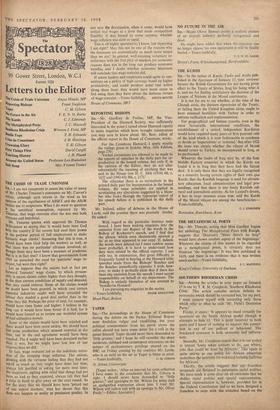Letters to the Editor
The Crisis of Trade Unionism keening Bishops TaPer No Future in the Air The Kurds The Metaphysical Poets Southern Rhodesian Crisis Some Tops Crise de Conscience Crowning Glory First Things First Teaching History Around the United States Soft Soap
Angus Maude, MP Frank Singleton C. M. Gibson F. E. N. St. Barbe C.J. Edmonds J. C. Maxwell Winston J. Field, MP T. H. Edwards J. H. Huizinga T. H. Gibson David Cargill J. H. Plumb Professor Leo Hamalian Mrs. Yvonne Tomes
THE CRISIS OF TRADE UNIONISM SIR —I am not competent to assess the value of many of Mr. Charles Timaeus's comments on Mr, Curran's article, although such straws in the wind as his ',Minion of the significance of ASSET and the AScW incline me to scepticism. What I do want to question is the uncritical assumption, repeated by Mr.
...
kimacus, that wage restraint after the war was both virtuous and beneficial.
Mr. Timaeus quotes with approval Sir Thomas ,Williamson as saying that 'it would have been God help the country if the unions had used their power in the postwar pericd of full employment to make fantastic wage claims.' Assuming that this is true, it would have been God help the workers as well, so that there was no particular altruism involved, al- though there may have been a measure of prudence. But is it in fact true? 1 know that governments from 1945 on preached the need for 'patriotic' wage re- straint, but were they right?
Let us suppose that the unions had in fact put forward 'fantastic' wage claims, by which presum- ably is meant claims rather higher than they thought, to the then current conditions of supply and demand, that they could enforce. Some of the claims would no doubt have been granted, in which case certain essential industries might well have attracted the labour they needed a good deal earlier than in the event they did. Perhaps the price of coal, for example, Would have risen faster and higher; I believe in the long run it would have been better if it had, for it Would have forced us to review our wasteful system of fuel utilisation sooner.
Some of the claims Would have been rejected and there would have been more strikes. We should have lost some production which seemed essential at the time, but in the end agreement would have been reached. The £ might well have been devalued earlier than it was, but we might have lost less of our reserves than we did.
In fact, wage restraint led to the indefinite exten- sion of the creeping wage inflation. The unions, glowing with the virtuous feeling that, they had not asked as much as they might have done last time, always felt justified in asking for more next time; the employers, sighing with relief 'that things had not been so bad as they .expected, always felt they had a little in hand to give away on the next round. As for the story that we should have been `priced out of our export markets,' time has shown that this does not happen so easily as pessimists predict. In any case the devaluation, when it came, would have settled real wages at a level that made competition feasible; it was bound to come anyway, whether wage inflation was slow or rapid.
This is all highly speculative, I know, but supposing I am right? May this not be one of the reasons why the Germans are economically so much more secure than we are? In general, well-meaning voluntary in- terference with the free play of markets for economic reasons does not in the long run produce economic benefits, and I doubt whether economic historians will conclude that wage restraint did.
If union leaders and employers could agree to con- centrate on a policy of high earnings based on higher productivity, and could produce some real action along these lines, they would have more cause to feel smug than they have about the dubious virtues of wage restraint.—Yours faithfully, ANGUS MAUDE






























 Previous page
Previous page